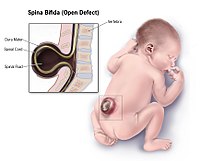Spina Bifida

Spina bifida is a type of neural tube defect in which the neural tube (the structure in an embryo that becomes the brain and spinal cord) does not completely close during development in the womb. This may result in part of the spinal cord sticking out through an opening in the spine, leading to permanent nerve damage. Babies born with spina bifida often have a fluid-filled sac, covered by skin, on their back. This is called a meningocele. If the sac contains part of the spinal cord and its protective covering, it is known as a myelomeningocele. The signs and symptoms of spina bifida can range from mild to severe, depending on the location and extent of spinal cord involvement. Possible symptoms include include a loss of feeling below the level of the opening, weakness or paralysis of the feet or legs, problems with bladder and bowel control, hydrocephalus, and learning problems.
The cause in most cases is multifactorial, which means that both genetic and environmental factors interact to cause spina bifida. Some cases may be due to the inheritance of specific gene mutations, chromosome abnormalities, or fetal exposure to teratogens. Maternal folate deficiency increases the risk to have a baby with spina bifida, and women who take folic acid supplements before and during early pregnancy are much less likely to have a baby with spina bifida.
Treatment typically involves antibiotics, sac closure, and ventriculoperitoneal shunting, usually shortly after birth. Long-term physical, occupational, and/or speech therapy may be needed. In some cases, the condition is life-threatening and is not treatable.
There is also a milder form of the condition called spina bifida occulta in which the nerves develop normally and health problems rarely occur.
The cause in most cases is multifactorial, which means that both genetic and environmental factors interact to cause spina bifida. Some cases may be due to the inheritance of specific gene mutations, chromosome abnormalities, or fetal exposure to teratogens. Maternal folate deficiency increases the risk to have a baby with spina bifida, and women who take folic acid supplements before and during early pregnancy are much less likely to have a baby with spina bifida.
Treatment typically involves antibiotics, sac closure, and ventriculoperitoneal shunting, usually shortly after birth. Long-term physical, occupational, and/or speech therapy may be needed. In some cases, the condition is life-threatening and is not treatable.
There is also a milder form of the condition called spina bifida occulta in which the nerves develop normally and health problems rarely occur.